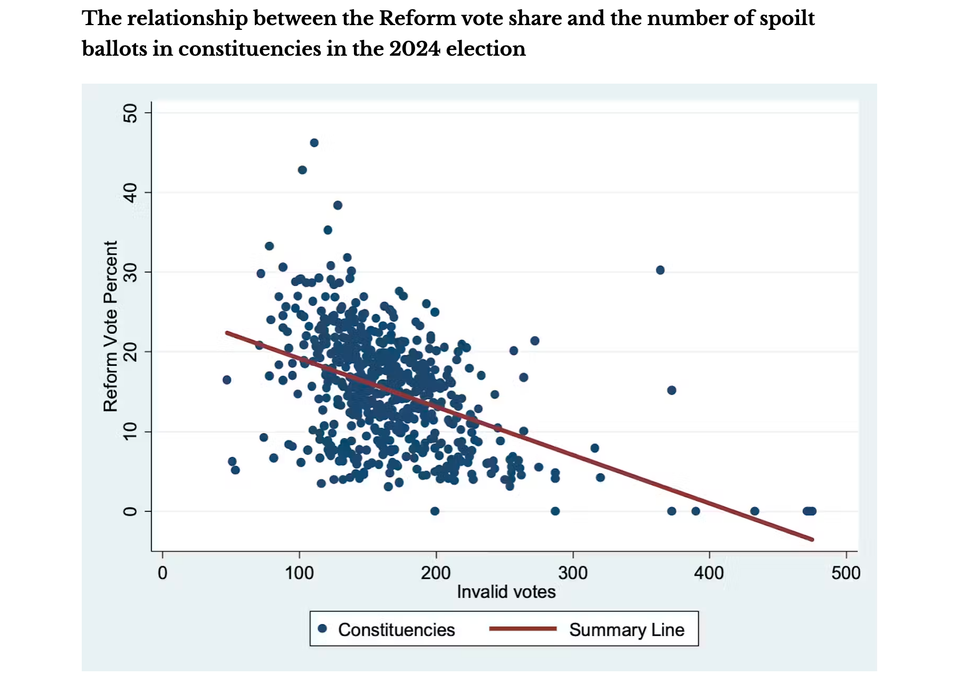Reform UK could upend British politics and enter Downing Street if pessimism with the two main parties persists, research suggests.
The shock projection follows what many pollsters regard as an astonishing run for the insurgent party after it came second to Labour in 98 constituencies at the General Election last year.
Despite only securing five MPs under the first-past-the-post system, where Reform picked up support augurs well for the party's future.
Research by Paul Whiteley, Professor of Government at the University of Essex, into the voting behaviour on July 4 has found that there was a strong negative relationship between the share of a constituency vote that went to Reform and the number of ballots spoiled in that constituency (see chart).
There was a strong negative relationship between the share of a constituency vote that went to Reform and the number of ballots spoiled in that constituency
P Whiteley, CC BY-ND
In other words, where people were voting for Reform, fewer people were spoiling their ballots.
Why is this significant?
Research shows that voters who spoil their ballots can be classified into two categories: those who simply make a mistake when filling in the ballot and those who are protesting about the current system.
As Professor Whiteley explains, in countries with complex electoral systems, accidental errors are more common. However, Britain’s first-past-the-post system, where voters select just one candidate, minimises this issue due to the straightforward nature of its ballots.
As a result, most spoiled ballots in the UK tend to be deliberate acts of protest, often expressed through blank ballots, write-in names, or even critical messages directed at parties and candidates.
This suggests that Reform gained votes from individuals who might otherwise have chosen to spoil their ballots or abstain from voting altogether.
If Reform galvanised apathetic Britons to head down to their ballot box on July 4, the party could conceivably tilt the balance of power by the next General Election.
How?
Polling suggests disillusionment with the two main parties is only getting worse.
A survey by Ipsos UK in January found confidence in the direction of the UK had fallen back to almost the same level as before the election, with 62 per cent saying the country was heading in the wrong direction.
That speaks volumes as the Conservatives were at the end of their 14-year reign and Labour had only been in power for six months.
If Reform galvanised apathetic Britons to head down to their ballot box on July 4, the party could tilt the balance of power by the next General Election
GB NEWS
Despite enjoying a slight bounce back after standing up for Ukraine as America wavers, Keir Starmer's lot has not improved since then.
New polling from Ipsos UK conducted in the immediate aftermath of the Spring Statement reveals that just one in five (19 per cent) say that Chancellor Rachel Reeves is doing a good job, with half (51 per cent) saying that she is doing a bad job, with criticism up seven percentage points from mid-March, before the Spring Statement.
For their part, the Conservatives under Kemi Badenoch have failed to land a blow over the sluggish growth and spiralling borrowing costs, as they are trailing both Reform and Labour in the polls.
Reform could, therefore, tap into this deep well of dissatisfaction with the two main parties, but success is far from assured.
Aside from the recent infighting, there could be limits to the party's appeal among the wider electorate.
As elections guru John Curtice recently put it to GB News, Reform still largely operating in a "niche market".
For example, a recent YouGov poll indicates that 90 per cent of individuals who voted for Reform UK in the 2024 general election are considering voting for the party again in the future.
This suggests a high level of loyalty among Reform UK voters compared to other parties, who received more wavering support.
On the one hand, this is encouraging, but it also suggests an echo chamber effect, with limits to the party's broader appeal.
Also, voting patterns have barely shifted since 2019.
At the last General Election, Labour barely increased its support in the Red Wall, suggesting that Reform doesn't have a huge untapped base of voters to go after.

 By GB News (Politics) | Created at 2025-03-30 08:09:49 | Updated at 2025-04-01 10:30:21
2 days ago
By GB News (Politics) | Created at 2025-03-30 08:09:49 | Updated at 2025-04-01 10:30:21
2 days ago










